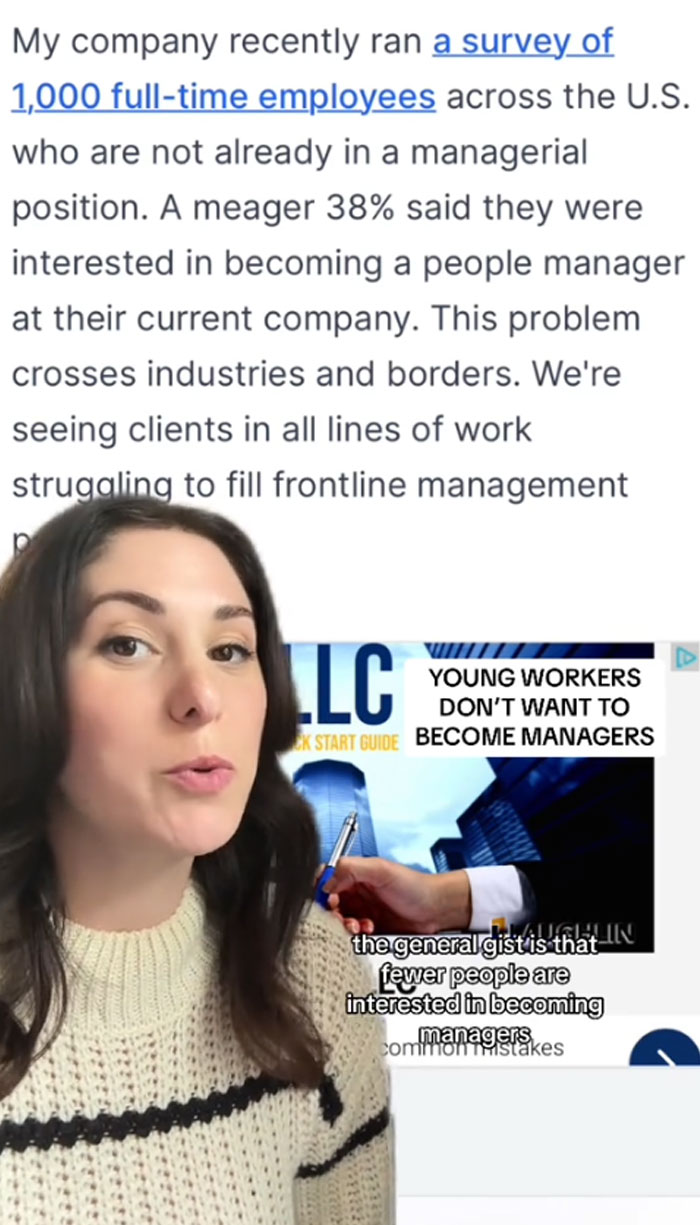“Glorified Unpaid Internship”: Woman Explains Why Millennials & Gen Z Don’t Want To Be Managers
Traditionally, the role of manager is coveted, with people going out of their way to compete for it. But recently, many employees have started to stay away from these positions like the plague. TikToker and career consultant Kyyah Abdul broke down all the reasons why Millennials and Gen Z employees are avoiding management roles.
People in the comments shared their thoughts and had a robust discussion about the state of younger worker’s decision-making. We reached out to Kyyah Abdul via email and we’ll update the article when she gets back to us.
More info: TikTok
Millennials and Gen Z seem to be resistant to taking management roles
Image credits: BGStock72 (not the actual photo)
A TikToker discussed a survey by ‘Entrepreneur’ which revealed that workers don’t find these positions appealing
Image credits: courageousleadership
“Nobody wants to become a manager anymore. Which I think is some version of ‘nobody wants to work anymore’”
This entire discussion was sparked by a survey of American workers done by “Entrepreneur“, which discovered that the majority of employees value their work-life balance and mental health too much to consider a leadership role. Workers are aware that companies are putting more and more pressure on managers, while not adequately compensating them for the increases in stress. Most workers do not actually want to reach the top of a company’s hierarchy, and see the roll of manager are just a complicated stepping stone.
Image credits: courageousleadership
In general, workers do not trust leadership at all, with another survey conducted by Gallup finding that only 21% of employees have confidence in their management. No wonder people are not lining up to put themselves in those positions. This is perhaps another nuance to the now constant cliche of “nobody wants to work anymore.”
TikToker and career consultant Kyyah Abdul shared her thoughts on why this is the case
Image credits: kyyahabdul
“The reason people don’t want to be a manager anymore is because it’s a glorified unpaid internship. Okay, yeah, you get paid for your work. But the pay is not worth the work that you’re doing, which is why I equate it to an internship.
You start at the associate level, which is entry-level, and you get paid half of the doubloon. You’re not doing that much work. So you’re like, ‘You know what, this is not that bad. But I want to make more money. So let me see if I can advance in my career and become a manager.’”
Image credits: kyyahabdul
“So you become a manager and you realize – ‘hold on, I only get a full doubloon, despite doing three times the work I was previously doing as an associate.’ This is where people get to a point in their career that they’re like, ‘You know what, I’m going to take it on the chin, continue to do this work, because I know it’s an internship opportunity to make it to the next level, where I’m really going to start making the pirate’s booty. I’m going to start really getting that lucky charms bag.’
Then you get other people that are like, ‘This isn’t worth it. I’d rather just either stay at the manager level or go back to around the associate level, see if I can get some more money.’ Because there are senior associate levels where you can get, you know, a doubloon and a half, perhaps.”
Image credits: kyyahabdul
“As you can see by this beautiful chart, the higher up you go, the less you do. And the problem that we have right now is a lot of people who are millennials and Gen Z are stuck at this point. Because people at the director and executive level who happen to be boomers and Gen X are getting a lot of money for doing not so much work, right?
So how do we get these people out and move these people up to keep the relationship flowing? Well, it’s kind of hard because these people don’t want to leave because of how much money they’re getting for very little work.”
Image credits: kyyahabdul
“I personally believe there are people out there that want to be managers and they want to progress up the ladder, but there’s a standstill right here. People aren’t able to move up the ladder because these people aren’t transitioning over to retirement. So I feel like there’s a surplus of people who have been at this manager point for a really long time, and they’re over it.
And then they have like younger people who are associates seeing how burnt out they are at a manager level, not being able to progress. So these people are like, ‘Heck no, I’m not about to go through what these people just went through for only half a doubloon!’”
You can watch the full video here:
@kyyahabdul Stitch with @Robyn L Garrett #kyyahabdul #corporateamerica #climbingtheladder ♬ original sound – Kyyah Abdul
These roles come with fewer and fewer advantages and more drawbacks
![“Glorified Unpaid Internship”: Woman Explains Why Millennials & Gen Z Don’t Want To Be Managers “Glorified Unpaid Internship”: Woman Explains Why Millennials & Gen Z Don’t Want To Be Managers]()
Image credits: Anna Shvets (not the actual photo)
While Kyyah Abdul isn’t wrong to call the position of manager an “internship” for a higher, leadership role, it can also be seen as the equivalent of customer support. While many companies do need customer support roles to actually conduct business, it’s an open secret that this position in many ways exists just to insulate upper management from the complaints of users, clients, or buyers.
In the same way, managers fill this role for leadership in many organizations. They have to make the tough calls and face employee backlash when budgets are cut, even though, often enough, they actually aren’t the ones ultimately responsible for the changes at the end of the day. Yes, they might be paid more and receive more benefits, but, often enough, the increase in wages is not proportional to the stress and workload then placed upon them.
In the past, some people would be willing to bite the bullet for a few years and just tough it out until they can get promoted out of management. But, as Kyyah Abdul mentioned in her video, the people in those upper roles aren’t exactly moving out with any haste. The result is that people end up stuck in management positions that they do not like and often can’t leave without taking a significant cut to their income.
Millennials and Gen Z are more aware of what it actually means to be a manager
![“Glorified Unpaid Internship”: Woman Explains Why Millennials & Gen Z Don’t Want To Be Managers “Glorified Unpaid Internship”: Woman Explains Why Millennials & Gen Z Don’t Want To Be Managers]()
Image credits: Mizuno K (not the actual photo)
At the same time, as the survey conducted by “Entrepreneur” indicated, upper management is putting more of a workload on middle managers, something most millennial workers in associate positions are well aware of. While US workers in particular are generally not the most open about their salaries, most folks can at least approximate where they stand in relation to their managers.
The evidence would suggest that most people do not find this increase in pay and responsibilities worth it. Unless you are a career-driven person with the goal of reaching an executive position, being a manager has very little appeal. Others, quite correctly, understand that just because they are good at their job does not mean they will be good as a manager. After all, the most infamous but also beloved TV boss, Michal Scott, from “The Office” was an excellent salesman, but a questionable manager.
After all, there are only so many hours in the day, and people realize that a bit more money, at the cost of all of one’s mental energy, isn’t worth it. Similarly, while most people hate it when their companies talk about “being a family,” it’s still good to have friendly and positive relations with your coworkers. Being a manager, in the age of cuts and layoffs makes that nearly impossible.
Commenters shared their thoughts and suggestions for what could be done
Traditionally, the role of manager is coveted, with people going out of their way to compete for it. But recently, many employees have started to stay away from these positions like the plague. TikToker and career consultant Kyyah Abdul broke down all the reasons why Millennials and Gen Z employees are avoiding management roles.
People in the comments shared their thoughts and had a robust discussion about the state of younger worker’s decision-making. We reached out to Kyyah Abdul via email and we’ll update the article when she gets back to us.
More info: TikTok
Millennials and Gen Z seem to be resistant to taking management roles
Image credits: BGStock72 (not the actual photo)
A TikToker discussed a survey by ‘Entrepreneur’ which revealed that workers don’t find these positions appealing
Image credits: courageousleadership
“Nobody wants to become a manager anymore. Which I think is some version of ‘nobody wants to work anymore'”
This entire discussion was sparked by a survey of American workers done by “Entrepreneur“, which discovered that the majority of employees value their work-life balance and mental health too much to consider a leadership role. Workers are aware that companies are putting more and more pressure on managers, while not adequately compensating them for the increases in stress. Most workers do not actually want to reach the top of a company’s hierarchy, and see the roll of manager are just a complicated stepping stone.
Image credits: courageousleadership
In general, workers do not trust leadership at all, with another survey conducted by Gallup finding that only 21% of employees have confidence in their management. No wonder people are not lining up to put themselves in those positions. This is perhaps another nuance to the now constant cliche of “nobody wants to work anymore.”
TikToker and career consultant Kyyah Abdul shared her thoughts on why this is the case
Image credits: kyyahabdul
“The reason people don’t want to be a manager anymore is because it’s a glorified unpaid internship. Okay, yeah, you get paid for your work. But the pay is not worth the work that you’re doing, which is why I equate it to an internship.
You start at the associate level, which is entry-level, and you get paid half of the doubloon. You’re not doing that much work. So you’re like, ‘You know what, this is not that bad. But I want to make more money. So let me see if I can advance in my career and become a manager.’”
Image credits: kyyahabdul
“So you become a manager and you realize – ‘hold on, I only get a full doubloon, despite doing three times the work I was previously doing as an associate.’ This is where people get to a point in their career that they’re like, ‘You know what, I’m going to take it on the chin, continue to do this work, because I know it’s an internship opportunity to make it to the next level, where I’m really going to start making the pirate’s booty. I’m going to start really getting that lucky charms bag.’
Then you get other people that are like, ‘This isn’t worth it. I’d rather just either stay at the manager level or go back to around the associate level, see if I can get some more money.’ Because there are senior associate levels where you can get, you know, a doubloon and a half, perhaps.”
Image credits: kyyahabdul
“As you can see by this beautiful chart, the higher up you go, the less you do. And the problem that we have right now is a lot of people who are millennials and Gen Z are stuck at this point. Because people at the director and executive level who happen to be boomers and Gen X are getting a lot of money for doing not so much work, right?
So how do we get these people out and move these people up to keep the relationship flowing? Well, it’s kind of hard because these people don’t want to leave because of how much money they’re getting for very little work.”
Image credits: kyyahabdul
“I personally believe there are people out there that want to be managers and they want to progress up the ladder, but there’s a standstill right here. People aren’t able to move up the ladder because these people aren’t transitioning over to retirement. So I feel like there’s a surplus of people who have been at this manager point for a really long time, and they’re over it.
And then they have like younger people who are associates seeing how burnt out they are at a manager level, not being able to progress. So these people are like, ‘Heck no, I’m not about to go through what these people just went through for only half a doubloon!’”
You can watch the full video here:
@kyyahabdul Stitch with @Robyn L Garrett #kyyahabdul #corporateamerica #climbingtheladder ♬ original sound – Kyyah Abdul
These roles come with fewer and fewer advantages and more drawbacks
![“Glorified Unpaid Internship”: Woman Explains Why Millennials & Gen Z Don’t Want To Be Managers “Glorified Unpaid Internship”: Woman Explains Why Millennials & Gen Z Don’t Want To Be Managers]()
Image credits: Anna Shvets (not the actual photo)
While Kyyah Abdul isn’t wrong to call the position of manager an “internship” for a higher, leadership role, it can also be seen as the equivalent of customer support. While many companies do need customer support roles to actually conduct business, it’s an open secret that this position in many ways exists just to insulate upper management from the complaints of users, clients, or buyers.
In the same way, managers fill this role for leadership in many organizations. They have to make the tough calls and face employee backlash when budgets are cut, even though, often enough, they actually aren’t the ones ultimately responsible for the changes at the end of the day. Yes, they might be paid more and receive more benefits, but, often enough, the increase in wages is not proportional to the stress and workload then placed upon them.
In the past, some people would be willing to bite the bullet for a few years and just tough it out until they can get promoted out of management. But, as Kyyah Abdul mentioned in her video, the people in those upper roles aren’t exactly moving out with any haste. The result is that people end up stuck in management positions that they do not like and often can’t leave without taking a significant cut to their income.
Millennials and Gen Z are more aware of what it actually means to be a manager
![“Glorified Unpaid Internship”: Woman Explains Why Millennials & Gen Z Don’t Want To Be Managers “Glorified Unpaid Internship”: Woman Explains Why Millennials & Gen Z Don’t Want To Be Managers]()
Image credits: Mizuno K (not the actual photo)
At the same time, as the survey conducted by “Entrepreneur” indicated, upper management is putting more of a workload on middle managers, something most millennial workers in associate positions are well aware of. While US workers in particular are generally not the most open about their salaries, most folks can at least approximate where they stand in relation to their managers.
The evidence would suggest that most people do not find this increase in pay and responsibilities worth it. Unless you are a career-driven person with the goal of reaching an executive position, being a manager has very little appeal. Others, quite correctly, understand that just because they are good at their job does not mean they will be good as a manager. After all, the most infamous but also beloved TV boss, Michal Scott, from “The Office” was an excellent salesman, but a questionable manager.
After all, there are only so many hours in the day, and people realize that a bit more money, at the cost of all of one’s mental energy, isn’t worth it. Similarly, while most people hate it when their companies talk about “being a family,” it’s still good to have friendly and positive relations with your coworkers. Being a manager, in the age of cuts and layoffs makes that nearly impossible.
Commenters shared their thoughts and suggestions for what could be done
Read original article here




























